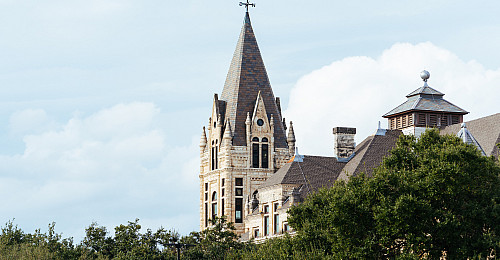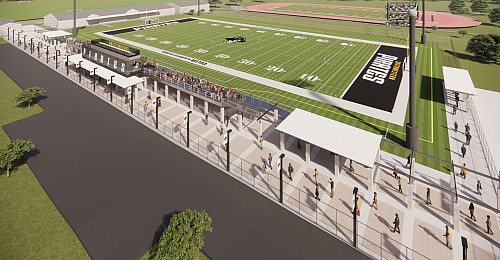Distinctive Collections
My Time as a Student Worker in Special Collections
Open gallery

By Natalia Kapacinskas, ’18
Last weekend, I graduated from Southwestern with a BA in English. I was a student worker in Special Collections for five semesters, and the job was incredibly formative for me, both academically and professionally. I want to use this blog post to reflect on how my projects in Special Collections have informed my undergraduate experience and influenced my future goals.
I remember the first time I walked into SU Special Collections nearly three years ago. I was working an afternoon shift at the InfoDesk—I think it was a Tuesday—when a video crew came thundering through the research commons with cameras and microphones. Glancing across the counter at the InfoDesk student workers, a member of the crew pointed at me and one of my coworkers and said that he wanted to borrow us as extras in the promotional video they were shooting for Special Collections.
My role in the video was to examine our Graduale in the reading room. As I did so, I remember thinking that all the primary sources in Special Collections made it a totally different kind of library than those I had seen before—totally different in incredible ways. I was filled with a sort of mysterious awe at all the stories it seemed to hold, and that was the moment I was bitten by the Special Collections bug. After a little research, I decided to apply for a student job in Special Collections for the next semester. In the years since, I have developed a much deeper understanding of the research and educational roles of Special Collections, but I haven’t abandoned my original sense of awe at our materials.
My first major project in Special Collections was to assist with indexing the archives of Senator John Tower’s constituent correspondence, an ongoing project in the department. Since I had no previous experience with archival organization or processing, the training I received for this project and my subsequent work in the archive completely changed the way I thought about how information can be organized. Not only did I become comfortable with handling and reading archival documents, but I also developed an understanding of how metadata is assigned to items and to make them discoverable for researchers. Since professors of history and political science courses at Southwestern often assign projects or papers that require students to reference the John Tower archives, my experience with this collection enabled me to conduct well-informed reference interviews with students in such courses. This introduction to archival processing also prepared me for similar archival projects in more recent semesters.
Another important set of tasks of my student work has revolved around exhibit curation. In the fall of 2016, I researched and prepared for an exhibit on miniature books using examples from our collection. The exhibit was installed in the spring, and the experience of writing labels and giving tours served as a useful introduction to the teaching tasks that are part of librarianship. In addition, this first experience prepared me to work with another student worker to train her to curate her own first exhibit. These tasks have further prepared me to join staff from SU Special Collections and librarians from other institutions to present a seminar, “Beyond Outreach: Working with Students and Classes as Curators,” at the ACRL Rare Books and Manuscripts Section Annual Conference in New Orleans in June. I am very excited for this opportunity, but it will not be the first instance in which Special Collections has enabled me to network within an academic community. Throughout my time in the department, I have participated in a reading group with librarians, interns, and other student workers, meeting weekly to discuss readings that address both theoretical and practical issues of working in a special collections library. Not only were these readings (from Sarah Werner’s “Weaving a Feminist Book History” to an excerpt of Alberto Manguel’s The Library at Night) interesting to think through, but discussing them with others really allowed me to see myself as part of the library community and showed me the fascinating possibilities of librarianship.
Lastly, I would like to speak to the extent to which my work in Special Collections has been influential in my undergraduate academic career. Looking back, I see that academic research experiences and my work in Special Collections have been important corollaries to one another. My work as a research assistant in the English Department and the process of writing an honors thesis in English are the two most academically rigorous experiences I’ve had at SU. Although I credit these opportunities with many valuable outcomes, I believe these processes taught me how to do research by asking good questions. On the other hand, my work in Special Collections has given me insight into the research process from another angle, essentially teaching me how to find resources when my questions were uncertain or ill-defined. I’ve come to see that these approaches are both important in the research process. It’s as if my academic experiences as an English major gave me a view of research from the outside looking in, while in Special Collections I have come to see the research process “inside-out.” Neither of these views has been more important than the other, but they have both been vital to my education. I have even seen how these two perspectives can work in tandem in my own academic ventures. For instance, without my experience navigating the catalog and our archival databases in specific ways for work projects, I probably would not have been able to locate contemporary book reviews of some (rather obscure) nineteenth-century titles while working on my honors thesis.
Altogether, these experiences in Special Collections have given me a valuable look into the profession of librarianship and the work of rare book and manuscript libraries. I enjoyed this glimpse so much that I have decided to pursue an MSIS with the goal of becoming a librarian myself! I consider myself incredibly fortunate to have worked under the incredible supervisors I’ve had at Southwestern’s Special Collections, who have so kindly opened the doors of their professional world to me and who have supported and guided my own work.














